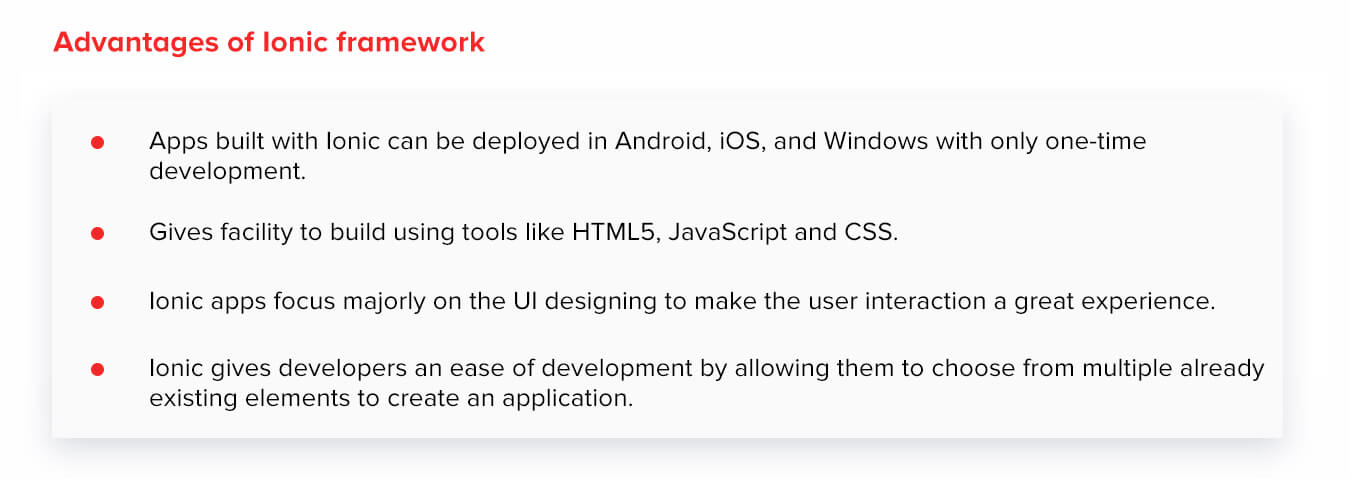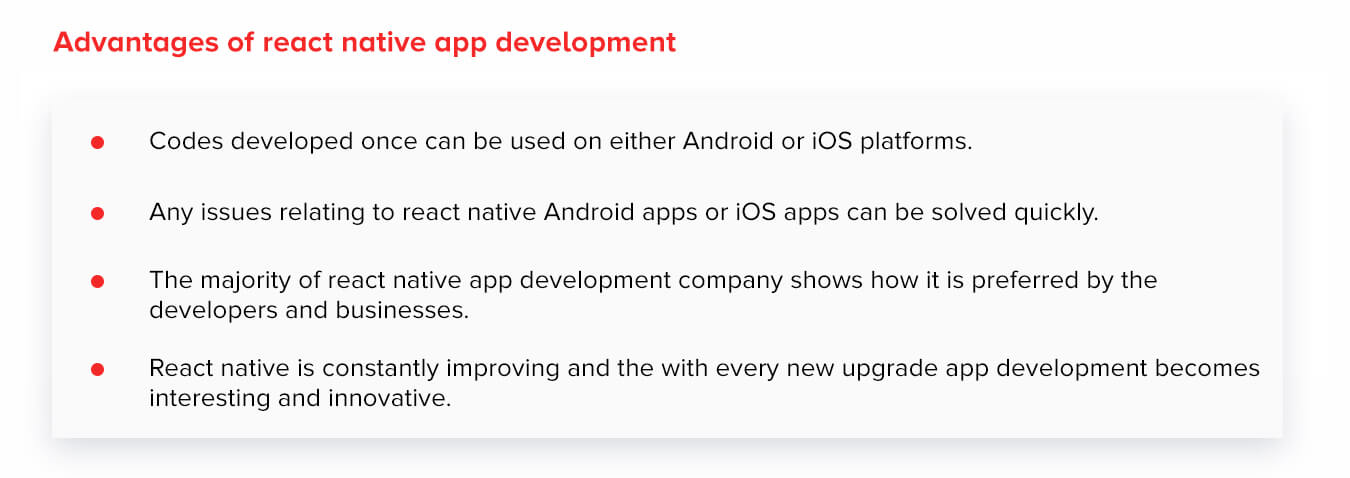Mobile app development isn’t the same as it used to be. The process included simple decisions like designs, features and cost of building the application. The scenario has completely changed now. Mobile app development now depends on one of the most crucial factors: Which framework to choose for app development?
There are various platforms like Flutter, React native, Ionic, Angular, etc. that are in the spotlight already. Each one of these is suitable to perfect different features in a mobile application. Recently Node.js and PHP also joined the list of the famous platforms after starting some serious debates in the industry.
When it comes to comparison of top development platforms, there are a ton of things to be compared. In one of our previous blogs, we chose a clear winner between Flutter vs React native by comparing as many factors as we could.
The two most preferred platforms that we will talk about in this article are: React Native and Ionic.
React Native was developed by Facebook and is developed using JavaScript which is the most used language by the developers. Vue.js and React.js are two of the best frameworks of JavaScript.
Ionic was developed by Drifty in 2013 and uses TypeScript for development. The latest version Ionic 3 can use TypeScript 2.1 and 2.2.
To get a clearer picture, let us understand each term individually:
Ionic
Ionic is an open-source platform for hybrid app development which uses JavaScript, CSS, and HTML5. Apps built with Ionic mainly focus on the appearance, feel and UI. Ionic uses a combination of Apache Cordova and Angular which gives developers a reason to choose it more often.
Ionic also offers developers tools like Sass, HTML5, and CSS to develop hybrid mobile applications that can be easily run in Android, iOS or Windows.
Benefits of Ionic framework

- Apps built with Ionic can be deployed in Android, iOS, and Windows with only one-time development.
- Gives facility to build using tools like HTML5, JavaScript and CSS.
- Ionic apps focus majorly on the UI designing to make the user interaction a great experience.
- Ionic gives developers an ease of development by allowing them to choose from multiple already existing elements to create an application.
What’s new in Ionic 3?
Ionic 3 or simply ‘Ionic’ is the latest upgrades for this development platform. The newest version has striking new features, such as:
- Compatibility with Angular 4.0.0
This version has included Angular 4 compatibility which enables smaller and faster development, supports the latest version of TypeScript and has many new features. - IonicPage decoration
IonicPage decorator can be used to set up deep links now without passing any link configuration to your app’s module. This new feature allows you to set up lazy loading in your application. You can also set priority to the lazy loading pages and customize each page’s configuration. - Compatibility with TypeScript 2.1 and 2.2
TypeScript latest versions are 2.1 and 2.2 and Ionic has been updated to work with these versions. This new facility will refine the build time of the apps and also type checking. Furthermore, it introduced mixed-in classes and the facility of using async-await in Ionic. Many more features like these are added in this upgrade.
- Lazy loading
Lazy loading is a technique where the content is not loaded all at once but as needed. Ionic 3 has introduced lazy loading of pages in the application which will enhance the speed of the app. Mobile app development companies like Appinventiv already use lazy loading for a better app performance. Without lazy loading, apps become slower for the reason that all the data is being loaded at the same time.
React Native
React Native, in simple terms, is a platform to create apps for specific operating systems. It allows developers to reuse the codes so that they do not have to build a whole new app from scratch. React Native was developed by Facebook and shares JavaScript that can easily be used for both Android and iOS.
Since the coding of Android and iOS apps are quite different, companies find it convenient to hire react native developers since they can develop in either Android or iOS.
[Extra: React Native vs Native Apps: When To Use Which Mobile App Development Platform]
Benefits of React native app development

- Codes developed once can be used on either Android or iOS platforms.
- Any issues relating to react native Android apps or iOS apps can be solved quickly.
- The majority of react native app development company shows how it is preferred by the developers and businesses.
- React native is constantly improving and the with every new upgrade app development becomes interesting and innovative.
Features of react native
- React native is reusable and hence saves cost. The same code can be deployed in Android and iOS which reduces the development time and cost. Even though the reduction is not much still reduces the overall cost.
- It has virtual-Dom support which lets you see the changes made in one window, immediately on the other window.
- The community of react native developers is quite huge and that is the reason companies are looking to hire react native developers at all times.
- This platform lets other developers peek into the code structure so that they can study and build on it further.
Ionic 3 vs React Native: Which is better?
React native vs Ionic has been in debate numerous times and everyone ends up having a different reason to choose either of the two. The comparison table below shows differences with basis between React native and Ionic:
| Basis | Ionic | React Native |
| Release | 2013 | 2015 |
| Developer | Drifty.co | |
| Languages | Coded in TypeScript | Codes in JSX |
| Reusability | Same code can be used to develop Android, iOS and Windows phone, web and PWA | Same code can be used to develop Android, iOS and Windows mobile apps |
| Performance | Average since it uses web-view | Excellent performance |
| Community support | Okay | Strong |
| Documentation | Very clear and consistent documentation | Quite basic documentation |
| Ease of development | Written only once and can be reused anywhere | Learned once and can be written anywhere |
| Learning | Easy to learn with plenty of pre-developed and pre-designed elements | Very few pre-developed elements which result in long learning time |
| Testing | Can be tested on any browser | Needs a mobile device |
According to you who won the react native vs ionic?
By now you must have gotten an idea about the basic differences between these two. Both React native and ionic are different from each other and each of them provides different benefits. To choose one from react native vs ionic will not be an easy task.
The Ionic and React native platforms have been compared briefly in the table above but for better understanding, we will look at some points in detail:
- Design
When it comes to the design of the app, Ionic takes the medal. The Ionic framework allows developers to use pre-developed elegant component which is not available in React native framework. The absence of the ability to design an attractive app does not make React native is a wise choice if someone is looking for appearances. - Performance
React native Android apps have an excellent performance record for a long time whereas Ionic doesn’t match it anywhere near. The reason is as simple as Ionic using web-view in the mobile application development. Even though Ionic apps are well designed yet they don’t beat react native in performance. - Community and Plugins
React Native has a strong community support and a variety of plugins available. The massive react native community is always active and continuously helping each other. On the other hand, Ionic community is also the developers solve any problems or issues but lack a huge number of plugins to obtain native features. - Cost
The cost of developing an Ionic app is cheaper than that of react native. Since the codes can be reused in different platforms in Ionic app development, it relatively reduces the costs of development. Many mobile app companies use Ionic app development when the projects are strictly budget bound.
React native app development, on the other hand, is slightly costly when compared to Ionic development.
What do brands prefer?
Before we move forward to the conclusion, let’s take a look at which brands used Ionic framework and which brands used the React Native framework. The table below lists some of the most renowned apps of all times:
| Brands that used Ionic framework for development | Brands that used React Native framework for development |
| MarketWatch | Facebook Ads Manager |
| Pacifica | Instagra |
| Sworkit | Myntra |
| JustWatch | UberEats |
| McDonalds Turkiye | Airbnb |
| ChefSteps | Gyroscope |
| Untappd | Discord |
So, which of the two should you choose?
Now that we have seen each and every aspect of both the development platforms, we can say that nobody can tell for sure that one is better than the other in every aspect. Both the development platforms are good for app development but each is used to fulfill a particular need that the other has not fulfilled yet.
If you need less cost, easy to build with excellent designs and great user interface then Ionic framework will be the best option.
If you need plugins, strong community, glitch-free performance even with large data then React Native will provide that.
Many mobile app development companies are looking for solutions to build apps with excellent performance at a faster rate. This can be done with react native framework as it used JavaScript which makes the development process fast.
But when we compare both the frameworks on overall results, React Native is a clear winner. The reason being its performance, efficiency, quality, development time and the strong community that backs it up. For the same reason, we see many big brands like Myntra, Instagram, Airbnb, UberEats, etc. using react native app development for themselves.
The future of Ionic framework of app development looks challenging with the constant upgrades in React Native framework. Ionic used to be preferred widely but due to the risks involved in the development developers are shifting to react native at a fast pace.

strategies your digital product.




